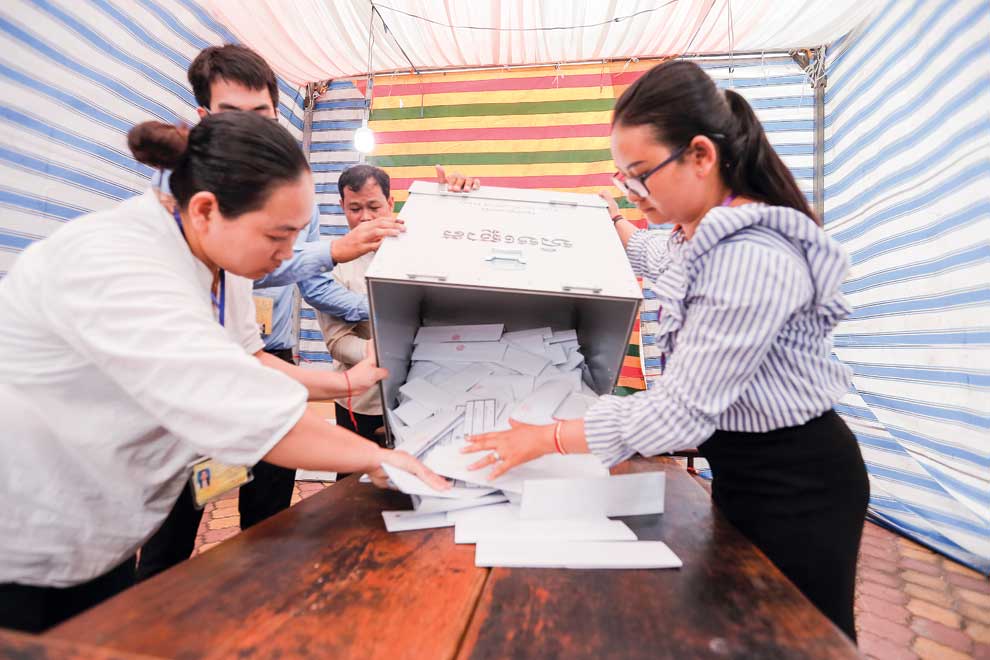
Prime Minister Hun Sen raises his finger after casting his vote in the national elections on Sunday as his wife Bun Rany (left) looks on in Kandal province’s Takhmao town. Pha Lina
China on Monday congratulated Cambodia on the successful completion of its sixth national elections and the Cambodian People’s Party (CPP), led by caretaker prime minister Hun Sen, on it victory, even as the European Union, France, Germany and New Zealand joined a chorus of criticism from Western countries on the polls’ “restrictive climate”.
A National Election Committee (NEC) spokesman hit back at the fresh criticisms on Tuesday, calling them “interference into the internal affairs of a sovereign state” that did “not reflect the reality of Cambodia”.
The latest backlash came after the United States, Australia and Canada on Sunday expressed their “profound disappointment” in the national elections after the Supreme Court dissolution of the opposition Cambodia National Rescue Party (CNRP).
Geng Shuang, the spokesman for China’s Foreign Affairs Ministry, told reporters on Monday: “China sincerely congratulates Cambodia on the successful running of the sixth National Assembly elections and the CPP led by its president, Hun Sen, on winning the election.
France criticises
“We hope that under the leadership of the forthcoming National Assembly and government, the Cambodian people will make greater achievements to their national developments.
“China stands ready to work with the Cambodian side to implement the important consensus reached between the two leaders, build a community of strategic significance with a shared future, and elevate China-Cambodia relations to a new height,” Geng added.
While China offered its congratulations, statements from the EU, France, Germany and New Zealand echoed the US, Australia and Canada in criticising the Kingdom’s election process after the dissolution of the CNRP, the banning from political activity for five years of 118 of its senior members and the arrest of its president, Kem Sokha, last year.
A statement from the French Foreign Affairs Ministry on Monday said: “France regrets that the Cambodia parliamentary elections took place in absence of the main opposition [CNRP], dissolved on November 16, 2017, while its president, Kem Sokha, has been in prison since September 3.
“These elections were held in a climate that did not permit the opposition, media, and civil society to function without restrictions.”
The EU said Sunday’s national elections lacked “credibility”.
“Over the past year, the Cambodian authorities have used the country’s judicial system and other forms of pressure to restrict the space for political opposition, for criticism and dissent, including by civil society,” a statement from its spokesperson said.
“The lack of genuine electoral competition and the absence of an inclusive political process mean that the July 29 election is not representative of the democratic will of the Cambodian electorate, and therefore its outcome lacks credibility.”
Meanwhile, New Zealand’s Foreign Minister Winston Peters expressed concern over the elections in which the main opposition party was excluded.

Officials begin counting votes on Sunday in the capital’s Boeung Prolit commune. Heng Chivoan
Peters said: “In the lead-up to the elections, Cambodia’s Supreme Court dissolved the main opposition party, the [CNRP], and its leader Kem Sokha was imprisoned. Without the main opposition party participating, the election resulted in a landslide victory for the governing party.
“For Cambodia to have legitimate democracy, it is essential that opposition voices can be heard. New Zealand calls on Prime Minister Hun Sen to reinstate the main opposition party and release all political prisoners, including opposition leader Kem Sokha.”
Germany joined the EU, France and New Zealand in calling for the release of Sokha and the reversal of the five-year ban from political activity of the 118 senior CNRP members. It also encouraged the Cambodian government to respect human rights.
‘Contempt for Cambodia’
NEC spokesman Hang Puthea on Tuesday rejected the criticisms, claiming they had “political characteristics” and did not reflect reality.
“The statements have political characteristics and do not focus on the technical workings of the NEC. [In the opinion of] the NEC, they are confused and have not reflected on the will and real needs of the Cambodian people … this tantamounts to interference into the internal affairs of a sovereign state.
“The statements by foreign nations do not reflect the reality of Cambodia . . . These countries . . . need to study the reasons behind the absence of the CNRP.”
He said that 500 international observers declared the elections free, fair, transparent and acceptable, while the nations issuing critical statements had not even observed the polls.
The Ministry of Foreign Affairs also expressed disappointment in the critical statements from foreign governments and said the manner of their criticism would affect the “spirit of friendship and cooperation between the nations.
“[The ministry] regrets the politically motivated assessments of some foreign governments who refused to send observers, [but] instead declared from the beginning until the end that the election was not free and fair,” it said in a statement.
“Disingenuously ignoring the technical quality of the electoral process is tantamount to displaying the utmost contempt for the will of the Cambodian people expressed through the 6,946,164 ballots.
“Such a manner undermined the spirit of friendship and cooperation that have been enhanced thus far and casts doubt on the genuine sincerity to witness Cambodia further progressing in its irreversible democratisation while enjoying the longest peace in modern history and consistent sustainable development,” the statement concluded.












